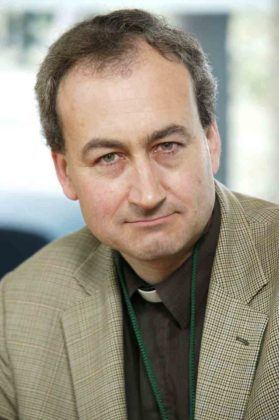 Discussion of a Citizen’s Basic Income – an unconditional, nonwithdrawable income for every individual – is now a mainstream global social policy debate. But how would it work? Malcolm Torry explains the elements that make up this idea and underlines the importance of agreeing on a shared definition to be used by all involved in the debate.
Discussion of a Citizen’s Basic Income – an unconditional, nonwithdrawable income for every individual – is now a mainstream global social policy debate. But how would it work? Malcolm Torry explains the elements that make up this idea and underlines the importance of agreeing on a shared definition to be used by all involved in the debate.
A Citizen’s Basic Income is an unconditional income paid to every individual. It’s as simple as that. It has a number of different names: Citizen’s Income, Basic Income, Citizen’s Basic Income, Universal Basic Income. They all mean exactly the same.
The amount you received would not depend on your income, it would not depend on your wealth, it would not depend on your household structure, it would not depend on your employment status, and it would not depend on anything else. Every individual of the same age would receive exactly the same: the same amount, every week or every month, automatically.
What’s unique about Citizen’s Basic Income, what matters, and what makes it work, is that it can be turned on at your birth, and turned off at your death, and no active administration would be required in between.
Sometimes words are added, but they aren’t necessary.
- Citizen’s Basic Income is unconditional, so within the jurisdiction in which it’s paid everybody would get it, so it is universal. There is no need to say that it is.
- Citizen’s Basic Income is unconditional, which means that it would not fall if your other income rose, so it is nonwithdrawable. There is no need to say that it is.
It is universal, and it is nonwithdrawable. But all we need to say is this: Every individual of the same age would receive exactly the same income, unconditionally.
Assumptions
However, it might be necessary to say something about assumptions that are generally made but not expressed. It is generally assumed that a Citizen’s Basic Income would be paid monthly, fortnightly, or weekly; it is assumed that the income would not vary during the year, but that regular annual upratings would be expected; and it is assumed that the income would vary with the recipient’s age, with a ‘standard’ amount being paid to working age adults, smaller amounts for children and perhaps to young adults, and larger amounts to individuals over a defined state pension age.
Conditionalities
This last assumption would appear to breach the ‘unconditional’ requirement, and strictly speaking it does: but because this conditionality is of a particular type, the breach is permitted. In relation to social security benefits, conditionalities exhibit two variables: ease of administration, and whether or not enquiry has to be made into an individual’s situation or activity.
Two of the expected advantages of a Citizen’s Basic Income are that it will be simple to administer, and it will require no bureaucratic intrusion into the lives of recipients. Their Citizen’s Basic Income would begin at their birth, the computer would automatically increase or decrease their Citizen’s Basic Incomes as they ceased to be children, when they became working age adults, and when they passed state retirement age, and it would turn off their Citizen’s Basic Incomes when they died. There would be no bureaucratic intrusion, and, indeed, no active administration at all.
With these principles in mind, the current Ontario ‘Basic Income’ pilot does not constitute a Citizen’s Basic Income. It describes its ‘Basic Income’ as:
The payment will account for other income and ensure a minimum level of income is provided. Participants will receive:
- Up to $16,989 per year for a single person, less 50% of any earned income
- Up to $24,027 per year for a couple, less 50% of any earned income
- Up to an additional $6,000 per year for a person with a disability.
Such payments are neither ‘individual’ nor ‘unconditional’.
The amount of the payment
All of the above would be generally agreed by academics and others who engage in debate about Citizen’s Basic Income: and that is important, because only if everyone involved in a debate shares the same definition of a term can rational debate occur. But there is one issue over which there is frequent disagreement.
A survey of organisations affiliated to BIEN, the global Citizen’s Basic Income organisation shows that for some national organisations only an unconditional, nonwithdrawable, regular and individual income that is paid to each working age adult at ‘subsistence level’ can qualify as a Citizen’s Basic Income, whereas for other organisations it needs not be at ‘subsistence level’ to count.
This is a dilemma, not only for BIEN, but also for the debate as a whole. One solution is to call a Citizen’s Basic Income at subsistence level (somehow defined) a ‘full Citizen’s Basic Income’, and anything paid at a level below that a ‘partial Citizen’s Basic Income’. My preferred solution is to call the latter ‘a Citizen’s Basic Income that is enough to live on’. This would retain the term ‘Citizen’s Basic Income’ for the most basic definition.
________
Note: Malcolm recently spoke at the Citizen’s Basic Income Day as part of the 2018 LSE Festival, Beveridge 2.0.
 Malcolm Torry has been Director of the Citizen’s Basic Income Trust since 2001; he is a Visiting Senior Fellow in the Social Policy Department at LSE; and General Manager of BIEN. He is the author of Money for Everyone: Why we need a Citizen’s Income (Policy Press, 2013: an almost completely rewritten new edition, with a new title, will be published in May), 101 Reasons for a Citizen’s Income: Arguments for giving everyone some money (Policy Press, 2015), The Feasibility of Citizen’s Income (Palgrave Macmillan, 2016), and Citizen’s Basic Income: A Christian social policy (Darton, Longman and Todd, 2016). Malcolm is a priest in the Church of England, and from 1980 to 2014 served in full-time posts in South London parishes.
Malcolm Torry has been Director of the Citizen’s Basic Income Trust since 2001; he is a Visiting Senior Fellow in the Social Policy Department at LSE; and General Manager of BIEN. He is the author of Money for Everyone: Why we need a Citizen’s Income (Policy Press, 2013: an almost completely rewritten new edition, with a new title, will be published in May), 101 Reasons for a Citizen’s Income: Arguments for giving everyone some money (Policy Press, 2015), The Feasibility of Citizen’s Income (Palgrave Macmillan, 2016), and Citizen’s Basic Income: A Christian social policy (Darton, Longman and Todd, 2016). Malcolm is a priest in the Church of England, and from 1980 to 2014 served in full-time posts in South London parishes.
All articles posted on this blog give the views of the author(s), and not the position of LSE British Politics and Policy, nor of the London School of Economics and Political Science. Featured image credit: Pixabay (Public Domain).








Sadly this article does not explain the benefits.
first universal income, like the castrated child benefit in the UK, is universal and paid to the mother as well as the father which reduces child poverty
second it is cheap – the Bank of Ireland offered to run a basic current account for free and we can eliminate many many civil servants
third it is fair – everyone gets it. People are not put off by unintelligible forms and dont suddenly get their benefit stopped
fourth it can simplify tax. If everyone gets a basic amount we can then eliminate most allowances and complexity
the problem is that it would need to be phased in and politicians are not interested in anything that doesnt work in the current parliament. and civil servants are not going to promote their own demise.
Dear Steven
All good questions.
Recent microsimulation research here: https://www.iser.essex.ac.uk/research/publications/working-papers/euromod/em12-17. An update coming soon.
No, the Basic Income isn’t taxable.
It’s efficient to give it everyone. Not doing so requires a means-test bureaucracy. And the wealthy are paying more in tax than they’re getting in BI, so why not just give it to them.
BI is a regular income, so like all regular income it would stop at the individual’s death. There would be nothing to retain.
Ontario’s experiment isn’t for a Basic Income. It’s income-tested and the amount depends on household structure. A Basic Income is by definition unconditional, and so not income-tested and it’s paid to the individual, not the household.
There are no perverse incentives related to a Basic Income.
Legislation to establish a Basic Income would be very simple.
Best wishes
Malcolm
Dr. Malcolm Torry.
Thanks for this article. I didn’t understand the idea fully so this helps.
But a couple of questions (which I understand are beyond the scope of the article):
Are there any cost-benefit analyses or macro models?
Is this income taxable?
What purpose is served by giving $16,000 a year to someone making $1 million a year?
Is whatever money remaining after death retained by the estate, or forfeited back to the government?
Does Ontario understand that their plan has a strong incentive for people to stay “single?” Are there other perverse incentives in the Basic Income idea?
Is it possible for any government to do something so simple? Wouldn’t it result in legal matters similar to a tax code (millions of pages of regulations and case law)? 🙂
Steven T Branca
Auckland